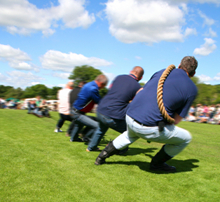Structure when you most need it
Datum: 2012-02-29 11:00

In most people’s work, the intensity and workload varies. Sometimes there is less to do, and sometimes the tempo accelerates to an almost unbearable level where we can barely keep up.
When there is a lot going on around us, it may be tempting to compromise in terms of our structured work-methods and just let everything go since there are so many things that need our immediate attention.
Sure, you could say that structure initially demands more marginal effort. It is true that it takes less time not to write down a task you realize you need to do, than writing it down. And it may appear easier to leave e‑mails unattended to in our inbox rather than moving them to a folder from which we easily can retrieve them later.
But looks can be deceiving.
If we give our structural habits slack when we need them the most, we do ourselves a disservice. When the pace is at its highest, we use our structural tools the least, although this is when we need them the most.
It’s you versus chaos
Look at it as a tug-of-war. If you practice immensely before the competition and work hard to adjust and fine-tune your technique for months in advance, but then let go of the rope as soon as you feel the opposing team tugging at the other end, the battle is lost before it even began.
Do the opposite. When the opponent is pulling so hard that you feel tempted to let go, give him a run for his money and pull even harder at your end.
Try a little harder. Make that extra effort. Do not give in, but spend those extra three seconds here and an extra ten seconds there, do that extra step in that particular task and make that extra notation after having a conversation, and by doing so, you do what is required to keep chaos at bay.
Indeed, chaos is said to stimulate creativity, but in your particular situation it is more about making deadlines and dealing with numerous commitments simultaneously and as smooth as possible. At times like these, few things are better than having good structure.
Do this
- Take a moment to think about which structural routines are essential for your work to run smoothly. These may for instance concern making to-do-tasks out of the e‑mails you would prefer not to act on immediately, rather than just tagging them as unread again. It may be dealing with everything in your physical inbox on a daily basis, so that no pile containing papers symbolizing undefined tasks which you will soon be behind on if not dealt with, forms. It could also be to instantly write down anything you come to think of since you will otherwise easily forget it, or it could be something different entirely.
- Choose one structural routine that you will make no compromises with, regardless the circumstances.
- If you feel it is appropriate, write it on a note and paste it on your computer screen or somewhere else where you cannot help to see it. Phrase it somewhere along the lines of, for instance, “What I can do now, I will do now” or “I will save the e‑mails I wish to keep in subfolders in my inbox”. Naturally, the subject matter might be something completely different.
- The next time you have a really intense period at work, really have a go at it, do your very best to pull through even though there is resistance, and the satisfaction of completion and accomplishment will be even greater.
Also: go to bed on time and make sure you get enough sleep. You will need it to think straight and with clear-minded perspectives.
You will harvest the fruits of your efforts
If you utilize the habits of structure you have acquired during calm conditions when the going gets rough, you will simply be able to handle the pressure in a lighter spirit.
You will sleep better at night since you in the late after-noon see that all the items on the to-do-list have been checked off and since you after gaining the habit of writing down absolutely everything you need to get done, know for a fact that you haven’t missed something important. You will do more of the right things at the right time as a result of keeping meticulous notes on the progress of your projects so that you easily can keep track of what you have promised to who and when you said it would be done. The fruits of your labor, the actual result of your effort, will be better since less gets unintentionally neglected and more of your clients or colleagues get the information they need, when they need it.
What is your way?
What are the vital structural habits which you will never compromise? Leave a comment to let others know!




